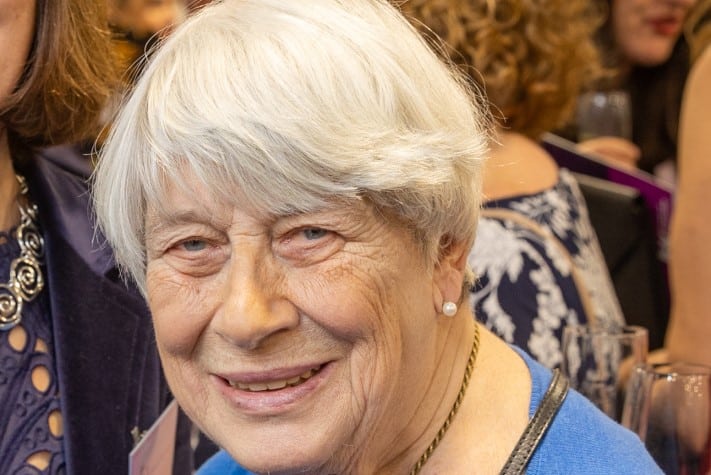6th April 2023
A discussion piece on Dilys Daws’ observations, ‘Standing next to the weighing scales’ by Alison Morton, CEO at iHV.

Dilys Daws
Dilys is one of the most important child psychotherapists of her generation and has had an impressive career that spans more than half a century. Since 1976, she has been transforming the lives of parents and their babies, working in primary care with health visitors and also at the Tavistock Clinic in London.
In December last year, I had the privilege to be invited to say a few words at the launch of Dilys’ most recent book, “Quietly Subversive – The Selected Work of Dilys Daws”. Dilys is a prolific writer. Amongst the many books that she has written for parents and professionals, this book contains a selection of Dilys’ greatest works, including her seminal paper “Standing next to the weighing scales” which has attracted the most attention. Dilys spent almost half a century ‘standing next to the weighing scales’ in a weekly health visitor and GP baby clinic at the James Wigg Practice in Kentish Town, London. Her observations, through the lens of psychoanalytic theory, shine a light on the purpose of ‘baby clinics’ that we must not lose sight of. Spoiler alert – the main reason that parents go to health visitor clinics is not to get their babies weighed!
Dilys tells me that she has now finally retired after her long and distinguished career, and “Quietly subversive” was her very last book – I was therefore extremely honoured that she chose to make her very last public speaking engagement a conversation with me, about the role of health visitors, for our recent iHV Podcast.
Alongside more than 50 years of clinical experience working with families with babies and young children, Dilys has lectured in child psychotherapy and infant mental health throughout the UK and abroad. Dilys has also politically lobbied for change in her “quietly subversive” way – Dilys tells me that the root meanings of these words are to “uproot” and “positively turn things around for good”. I am definitely signed up for that! She has been credited with changing the way that practitioners work now, “bringing the baby into the room” and influencing national policy on infant mental health.
Her work has shaped my own thinking as a health visitor and enhanced my understanding of parenthood, postnatal depression and parent-infant relationships throughout my career. It is unusual to have a psychotherapist in a baby clinic and I’ve never been to the James Wigg practice, but through Dilys’ powerful writing, I am transported there. I can picture the ‘baby clinic’ in my mind – the sounds, the people and the contrast between the busyness of the clinic and the quietness of Dilys as a psychotherapist, standing next to the weighing scales. Babies can’t speak, but they do have a voice if only we will all pause, and observe, and listen.
Dilys’ work is as relevant today as it was in 1985 when Dilys started to write about her observations. As health visitors, we face a constant tension between the drive for so-called efficiency and the importance of not losing sight of the overarching ‘purpose’ of health visiting – to search for health needs and to prevent, identify and support families with problems early, to avoid them reaching crisis point.
Whilst efficiency is an important goal in an increasingly stretched health and care system, it is possible to be more efficient and less effective at the same time. How often have you heard the challenge that “parents don’t need to weigh their babies so often”, “drop-in clinics should be stopped”, “parents should only attend if they have a specific problem”? But in doing so, are we missing those that we are most wanting to reach?
Progress is important. The health visiting profession has a history that spans more than 150 years. During this time health visitors have adapted their work to address the most pressing public health challenges of the day, and the needs of the communities they serve. In many ways, the current landscape of change is no different – adapting to change is in our profession’s DNA.
Different approaches will work for different people, new technologies provide many benefits, and choice is important. I was taught early in my career that we need to use the evidence to drive change. And that is why it is so important to be reminded of Dilys’ observations that are captured in a couple of short excerpts from her papers below. Dilys talks about parents’ deepest fears that can affect their wellbeing and relationship with their baby,
“Mothers and fathers, particularly with first babies may have an infinite dread that they are unable or unworthy to look after a baby properly, and that the proof of this will be that the baby does not survive. For many, the [regular] confirmation that the baby has survived, even that it is doing well, become a validation for the mother by the health visitors that she is being a ‘good enough mother”.
Dilys notes, “The weighing scales are important as a focal point for the baby clinic”.
Whilst weighing may be the rationale for coming – or regarded as the ‘entry ticket’ to the clinic – the much more significant purpose of the ‘baby clinic’ can be easily overlooked:
Dilys writes:
“The baby’s body is looked at, appreciated and measured by parents and professionals. Also apparent is the quality of the mother’s ability to protect her infant. Babies are vulnerable in their nakedness when put on the weighing scales and picked up again. We all know the infants’ startle reaction when their clothes are taken off. Small babies can look as though they feel they are ‘falling to pieces’ at this moment. Many mothers intuitively sense this and wrap their baby round by holding their gaze and with their voice, as well as with their hands.
Others cannot do so, and the baby’s vulnerability is exposed. All this can be noticed by a receptive health visitor”.
Through Dilys’ rigorous observations, she describes health visitors as the ‘emotional safety-net’ for parents and babies,
“because they are available to all families of new babies, health visitors are able to support families through the uncertain days of getting to know a new baby, and how to care for it… the beneficial effect of this is unquantifiable. When families are in emotional trouble, the health visitor, who already has a relationship built on many meetings and much knowledge, is in the best position to help. This implies caseloads that allow time to work with families that do need more attention….”
Like Dilys, pretty much every health visitor that I know will dispel the myth – we all know that parents never really come to the ‘baby clinic’ to get their babies weighed. ‘Weighing’ just provides an acceptable, and non-stigmatising, gateway into the universal health visiting service and a whole raft of other support. This is particularly important for people who struggle to access services, or speak up about the things that are worrying them most. Infant mental health problems, tensions in couple relationships, perinatal mental health problems, clinical vulnerabilities, social issues, domestic abuse and safeguarding all come to the surface in the ‘baby clinic’.
The title of these drop-in ‘baby clinics’ doesn’t really do justice to the breadth and purpose of the health visitors’ child and family health clinic and their role. In a recent report, Early Moments matter, UNICEF-UK described health visiting as, “the backbone of early years services across the UK… the ‘safety net’ around all families”.
What do you think? I am very grateful that I live in a world that has Dilys Daws in it. She helps me keep my eyes focused on the things that really matter – people, including babies. I am also grateful that there is a growing movement of people and organisations who have picked up Dilys’ call to be ‘quietly subversive’, to speak up for babies – because they matter.
Watch our iHV film, “Health visiting in your community” which shines a light on the vital work of health visitors.
Watch Dilys’ ‘Legacy interview’ on YouTube here.
Dilys’ book “Quietly Subversive – The Selected Work of Dilys Daws” is available to purchase in hardback or e-book from Routledge here. And we are delighted that Routledge is offering our members a 25% discount (please use discount code QSDD25) which is valid from now until 31 October 2023.
Alison Morton, CEO, iHV








